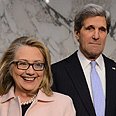
Kerry: US will do 'what it must' to prevent nuclear Iran
At confirmation hearing, Obama's nominee for secretary of state says on Iran, 'Our policy is not containment. It is prevention.' Adds: Window on two-state solution could shut and that would be disastrous
WASHINGTON – Sen. John Kerry, President Barack Obama's nominee for secretary of state, said Thursday that the United States will "do what we must" to prevent Iran from developing a nuclear weapon even as he signaled that diplomacy remains a viable option with Tehran.
Testifying at his confirmation hearing, and with Senate approval a foregone conclusion, Kerry, a Democrat who lost the 2004 presidential election, addressed a range of concerns raised by members of the Foreign Relations Committee, from his past outreach to Syrian President Bashar Assad to Republican concerns about one of their number, former Sen. Chuck Hagel, to be defense secretary.
Related Stories
- Kerry: Supports pro-Israel laws, opposes settlements
- Op-ed: Is John Kerry good for Israel?
- Clinton recaps years as secretary of state
"The president has made it definitive - we will do what we must to prevent Iran from obtaining a nuclear weapon," Kerry said in his opening statement. "I repeat here today: Our policy is not containment. It is prevention, and the clock is ticking on our efforts to secure responsible compliance."
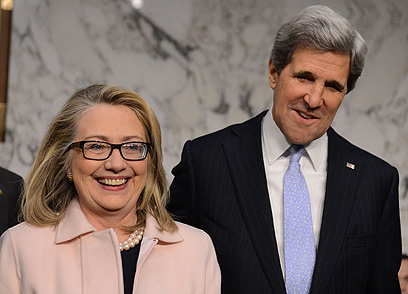
Kerry and Clinton (Photo: AFP)
Pressed on Iran and its nuclear ambitions, Kerry said he was hopeful that the US and other nations could make progress on the diplomatic front, but that Tehran needs to understand it must prove that its program is for peaceful purposes.
"It is not hard to prove," he said, stressing that "intrusive inspections" are required.
'Two-state window closing'
Addressing last Tuesday's national elections in Israel, Kerry told the committee: "We still don't know which government it's going to be. I pray that maybe this will be a moment that will allow us to renew the effort to bring the parties to the negotiating table and go down a different path than the one they were on in the last few years. I would like to try and do that."
The senator said unilateral moves were not beneficial and instead of symbolic acts, there needs to be true progress in the peace negotiations. He said that if the peace process is not advanced, the "door or window on a two-state solution could shut on everybody and that would be disastrous."
Kerry also warned the Palestinians not to take Israel to the International Crimes Court in The Hague, adding that unilateral steps cannot replace direct talks.
"President Obama is deeply committed to a two-state solution. I've been reading lately speculation about whether or not he is committed to the process or what he thinks or believes, et cetera. I think a lot of it is simply wrong and blown out of proportion. The president understands the stakes and the implications in the Middle East.
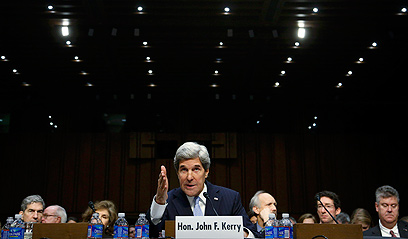
Kerry: Unilateral moves, not beneficial (Photo: Reuters)
"And the almost -- I mean, so much of what we aspire to achieve and what we need to do globally, what we need to do in the Maghreb and South Asia, South Central Asia, throughout the Gulf, all of this is tied to what can or doesn't happen with respect to Israel-Palestine. And in some places it's used as an excuse. In other places it's a genuine, deeply felt challenge.
"I'm not going to say anything that prejudices our ability to try to get a negotiation moving in the appropriate way, in the appropriate manner, and I'm not even going to go into what that is. But I think I personally believe -- I've been at this for what, almost 29 years in this committee -- we've been at this. I've watched all of it. I was on the lawn when we were there with the handshake -- Arafat, Begin (sic; Rabin) -- and I've been through seven prime ministers and nine in all. Two of them were the same. And I've seen Wye Plantation and Madrid and Oslo and Taba and so forth.
"We need to try to find a way forward, and I happen to believe that there is a way forward. But I also believe that if we can't be successful, the door, window, whatever you want to call it, to the possibility of a two-state solution, could shut on everybody and that would be disastrous, in my judgment.
"So I think this is an enormously important issue, and I will never step back from my commitment to the state of Israel, which I have shown for the 29 years I've been here. But I also will not step back from my understanding of the plight of Palestinians and others who are caught up in the swirl of this, young children who I've seen who have hopes for future, and I'd like to see us deliver."
Obama's Kerry
In an unexpected exchange, Kerry found himself defending Obama's controversial pick of Hagel to be the next defense secretary against Republican criticism.
Sen. Bob Corker, the senior Republican on the panel, expressed concerns about Hagel's support for an 80 percent reduction of US nuclear weapons, a major issue for the Tennessee lawmaker and his home state. The Y-12 nuclear facility is located near Oak Ridge, Tennessee, and any cuts would have an impact on local jobs.
"I know Chuck Hagel. I think he is a strong patriotic former senator, and he will be a strong secretary of defense," Kerry said of Hagel, who like Kerry served in Vietnam.
The Massachusetts senator urged lawmakers to be realistic, arguing that an 80 percent cut is an aspiration that would be unlikely in the current climate.
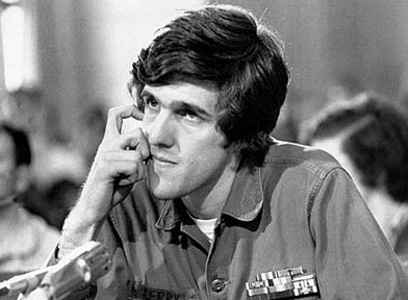
A young Kerry testifying against Vietnam War
On Syria, Kerry was asked about his outreach to Assad, now an international pariah after months of civil war and unending violence against his citizens. Kerry said there was a moment where Syria reached out to the West, but that the moment has long passed.
"History caught up to us. That never happened. And it's now moot, because he (President Bashar Assad) has made a set of judgments that are inexcusable, that are reprehensible, and I think is not long for remaining as the head of state in Syria," Kerry said. "I think the time is ticking."
The hearing was an odd juxtaposition. Kerry has served on the committee during his entire 28 years in the Senate and has chaired the panel for the last four. On Thursday, he sat at the witness table, his voice at times cracking from emotion, facing his colleagues and friends.
Obama chose Kerry to succeed Secretary of State Hillary Rodham Clinton, who introduced the senator. "John is the right choice," Clinton told the panel. "He will bring a record of leadership and service that is exemplary."
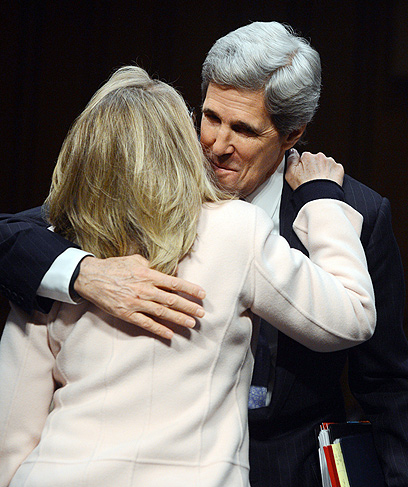
Passing the torch (Photo: AFP)
Sen. Bob Menendez, a Democrat and the incoming chairman who presided over the confirmation hearing, noted that Kerry was the first senator on the panel in a century to ascend to the Cabinet post. Corker told Kerry, "you've almost lived your entire life for this moment."
A lone protester shouting about the Middle East interrupted the hearing. Just as Kerry completed his prepared testimony, the woman began shouting about the Middle East and was escorted from the room.
The Vietnam War, a long, bitter conflict that decimated a generation of draft-age men, played a prominent role at the hearing.
In his testimony, Kerry alluded to his controversial moment before the committee some 42 years ago, when the decorated Vietnam veteran testified about his opposition to the war, and famously asked, "How do you ask a man to be the last man to die for a mistake?"
"Today I can't help but recognize that the world itself then was in many ways simpler, divided as it was along bi-polar, Cold War antagonisms," Kerry said. "Today's world is more complicated than anything we have experienced - from the emergence of China to the Arab Awakening: inextricably linked economic, health, environmental and demographic issues" as well as issues such as proliferation.
McCain, who also introduced Kerry, said the roots of their friendship was their work on a committee seeking to resolve the status of POWs and missing in action from Vietnam as well as efforts to ensure normal US relations with Vietnam during President Bill Clinton's administration.
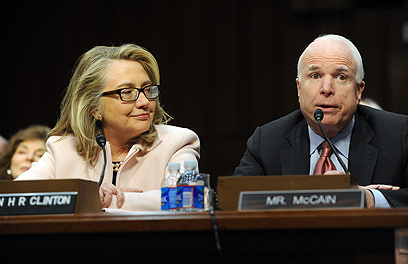
Clinton and McCain (Photo: AFP)
"Helping to establish a relationship with Vietnam that serves American interests and values, rather than one that remained mired in mutual resentment and bitterness, is one of my proudest accomplishments as a senator, and I expect it is one of John's as well," McCain said. "Working toward that end with John, and witnessing almost daily his exemplary statesmanship, is one of the highest privileges I've had here."
One down, two to go
The hearing is the first of three for Obama's national security nominees, and the least controversial.
Hagel will face tough questions about his past statements on Israel, Iran, nuclear weapons and defense spending at his confirmation hearing next Thursday before the Senate Armed Services Committee. John Brennan, the president's choice for CIA director, will be quizzed about White House national security leaks and the use of unmanned drones at his hearing next month.
The job of the nation's top diplomat would be the realization of a dream for Kerry, whom Obama passed over in 2008 when he chose Clinton. When Joe Biden became vice president, Kerry replaced the former Delaware senator as chairman of the committee.
Obama nominated Kerry after Susan Rice, the US ambassador to the United Nations, removed her name from consideration following criticism from Republicans over her initial comments about the attacks on the US Consulate in Benghazi, Libya.
Kerry, 69, is the son of a diplomat and has served as Obama's unofficial envoy, using his skills of persuasion with leaders of Afghanistan and Pakistan.
- Follow Ynetnews on Facebook and Twitter
- Receive Ynetnews updates directly to your desktop










